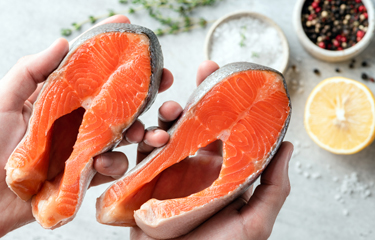Monterey Bay Aquarium’s Seafood Watch program has placed Santiago, Chile-based fishing- and salmon-farming firm Blumar Seafoods on its “yellow list” as a good alternative for farmed Atlantic salmon.
Blumar recently launched the “Laguna Blanca” antibiotic-free salmon brand that touts sustainability as its selling point, employing Aquaculture Stewardship Council (ASC) standards to raise salmon without antibiotics throughout the entire cultivation cycle in Chile’s southernmost Magallanes region. Miami, Florida, U.S.A.-based BluGlacier – founded in 2016 as a joint venture between Blumar and fellow salmon farmer Ventisqueros, one of Chile's largest salmon importers to the U.S. – worked with Blumar to create Laguna Blanca.
The Seafood Watch listing is “a major milestone that will help differentiate the Magallanes origin, including Blumar´s Laguna Blanca brand, as these lists have a strong influence on hundreds of professional seafood buyers and thousands of consumers,” the company said.
“At Blumar, we take our commitment to sustainable seafood incredibly seriously,” Blumar Sales and Marketing Director Daniel Montoya said. “We are very excited about this recognition and have been working hard to get Monterey Bay to recommend our Magallanes salmon as [a] ‘good alternative’ as we continually explore how we can ensure that the products we deliver are being responsibly farmed. We have enjoyed a good reputation with our Aquaculture Stewardship Council-certified salmon, and now this achievement is an additional boost that will open our doors to customers that follow Seafood Watch.”
Blumar recently announced a positive third-quarter 2021 with net profits at USD 4.37 million (EUR 3.89 million), compared to a net loss of USD 14.4 million (EUR 12.8 million) in the same quarter of 2020. Revenues surged 38 percent year-over-year to USD 160 million (EUR 142 million), outpacing the 3.4 percent increase in cost of sales to USD 124.6 million (EUR 110.8 million). In November it sold its 45 percent shareholding in Frigorífico Pacífico, a storage service company for frozen products in Chile’s Biobío region, for USD 15.4 million (EUR 13.7 million).
The Monterey Bay Aquarium program creates science-based recommendations, assigning seafood a red (“avoid”), yellow (“good alternative”), or green (“best choice”) rating, based on its sustainability and environmental impact. Many sources of farmed salmon are now rated in Seafood Watch’s “avoid” category, for reasons related to chemical use, disease, and salmon escapes, though Atlantic salmon farms in Chile’s Magallanes Region XII saw ratings improve from red “avoid” to yellow “good alternative,” thanks to yellow ratings for six different criteria and a red rating in only the effluent category.
The Aquaculture Stewardship Council recently issued a press release clarifying Seafood Watch rates all ASC-certified salmon as a buy option.
“All ASC-certified salmon, from anywhere in the world, is rated as a buy option for environmentally conscious consumers. This overrides any rating that a region may have been given. This is because Seafood Watch have benchmarked ASC’s Salmon Standard and recognized it as consistent with their own criteria for environmental sustainability,” ASC said. “It can be confusing looking for food that has been produced responsibly. At ASC, we make it as simple as possible by only allowing our label to be used on products from farms that have demonstrated their excellent social and environmental performance.”
Photo courtesy of Blumar







